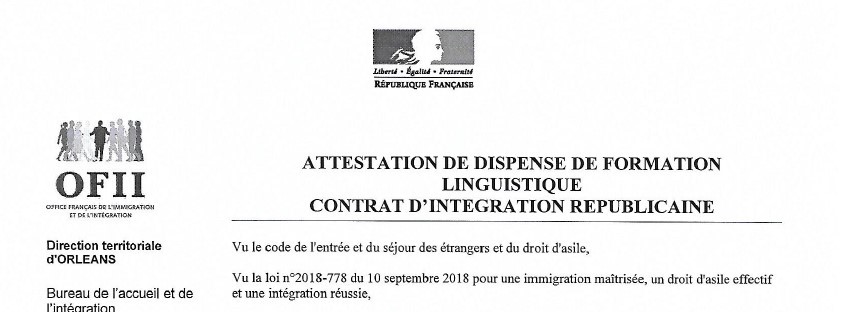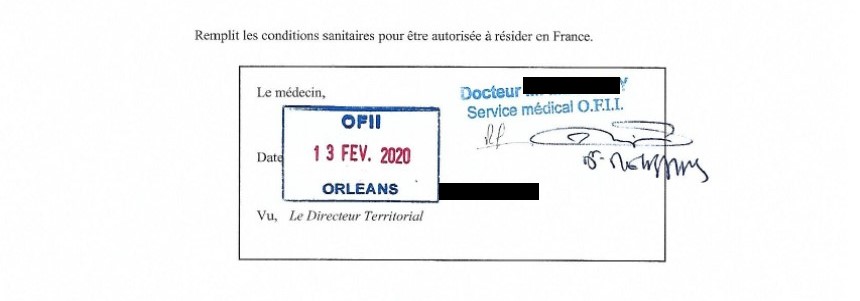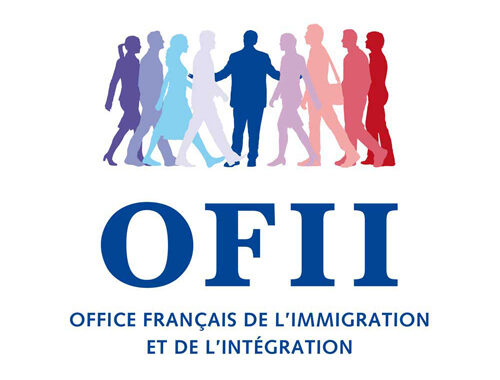You Have Validated Your VLS-TS, Now What?
Now you wait, patiently, and for a long time, I might add.
When I validated my visa mid-September of 2019, I honestly never thought I would have to wait four months to receive my initial convocation from the OFII (Office Français de l’Immigration et de l’Intégration). Many people had stated the convocation came much more quickly for them.
By this time, my husband and I had moved regions, but did not notify the OFII of our address change. Regardless, the convocation that I received in late January in the mail—I was not notified whatsoever through email—was for the medical visit and the “visite d’accueil”. Both for February 13th 2020 in Orléans.
I was so relieved to finally have any sort of contact from the OFII. Getting time off of work in such short notice was like pulling teeth! I wish they could have notified me sooner, not less than 30 days before this mandatory meeting.
On the Day: My OFII Meeting
All of the below information is regarding my experience with the OFII/OFII process of Orléans taking place February 13, 2020. Please note, everyone’s’ experience is different (along with necessary documents) and this is simply an overview of the process and my experience of it.
The Medical Visit
My medical visit took place at 10am at a clinic which was right across from the train station. I checked in, took a trip to the toilet, and read a few pages of a book before they called me. Despite my fears of being there for hours, the whole process was extremely fast.
I was called by a nurse and told to undress in a little changing cabinet. She got me when she was ready and asked me some preliminary questions (am I pregnant, etc.). She then told me to put my chest against this cold metal plate so she could take an x-ray.
As it says, you do not need to fast before the visit as the x-ray is the only thing they do; it is to check for tuberculosis. In my experience, they did not ask for vaccination records or to see my glasses.
Once finished, the clinic sent the information to the OFII and I was able to go. The process took about 20 minutes.
What you need to bring:
- Convocation
- Passport
- (they did not check these)
The Visite d’Accueil
My welcome visit at the OFII of Orléans took place the same day as my medical visit, but was scheduled for later in the day at 1:30pm at 4 rue de Patay. This is an unmarked building about 5 minutes’ walk from the train station.
Although I arrived somewhat early, there was already a large group of people waiting outside. This did not matter as we had to wait for a security guard to check us in by viewing our convocation.
Once he let us in, we formally checked in using our passports, timbres and validation pages. I did not have my validation page and the woman gave me a hard time about this, but let me through anyway. She directed me to a large room at the end of the hall filled with desks and a table with a pitcher of water and cups.
In all, we were about 10-12 people in this room and I was surprised there weren’t more given the number of people outside. It turns out that some were directed elsewhere. Once everyone checked in, a doctor gave us a health questionnaire (in English or French) that we would discuss with her later. This was simple yes/no responses.
After that, another person came in to give us a brief PowerPoint (in French) of the integration process. She detailed that there are four modules of the “formation civique” and what resources we have access to (such as free language courses).
The Language Test
Next came the “test de positionnement linguistique,” a 20-minute written French language placement test. Not only had I not taken any French tests since university, the damn thing had to be in pen (no pressure, right?).
It is a four-page test to see if you have level A1 in French. There is matching, multiple-choice, one half-page, and one full-page essay covering topics such as objects, directions, the museum, and writing a letter to your children about their chores. Essentially, all the things you learn in French 1 (or at least I did).
At this point, I felt really bad because you could tell who was struggling. All the directions (oral or written) were in French. Plus, the woman in charge of keeping time said that she was unable to answer any questions during the test. Unfortunately, there was one lady in particular who clearly did not understand and kept on trying to ask questions, to no avail.
I don’t know if this is me perceiving it as callousness, but the fact that the examiners are not allowed to answer any type of question during the placement test is extremely disheartening. I am not sure if this is what you can expect elsewhere, but if you do not have any experience in French, do not be discouraged to try! Even with the essays, you may know some words and can show to the examiners that you know something and have put in some effort during your time in France thus far.
Once the test was complete, they collected them for scoring and we were to wait for our personal interview, or to visit the doctors. For the personal interviews, there was a clear order, but for the meetings with the two doctors, it was solely by chance and luck.
1st Doctor’s Visit
I was first seen by the female doctor who took my height and weight. We went over the questionnaire and she asked me some questions.
The Interview
I was next called in for my interview. The first thing she said to me was that I got the highest score on the test out of everyone. No lie, that put me in a good mood.
After, we talked a bit about my life thus far in France. I told her how I changed regions, taking this opportunity to change my address. Obviously, I needed to use my new proof of address in Troyes. Since I had a job, she asked me if I had a “numéro de sécurité sociale” (social security number). I showed her my provisory number. She also asked me which state I am from and if I have a driver’s license. She suggested that I get it exchanged, as well as equivalizing any foreign degrees I may have.
Once she went over this information, she told me that I do not have to take any language courses and asked me to sign my CIR (Contrat d’Intégration Républicaine) or Republican Integration Contract. The CIR dictates that you will try to integrate into French culture/life in France and that you will take the 4 civics courses and, if necessary, language courses. These are part of the terms of your visa and determine the ability to renew your stay once it reaches expiry.
During this point, I should have received information for my first meeting for the formation civique. However, since I notified them of an address change, and subsequently a change of region, I did not.


2nd Doctor’s Visit
Lastly, I met with the other doctor who also questioned me about the answers in my questionnaire. He took my blood pressure and had a review of my vaccination record (this was not obligatory). He told me that my chest x-ray came out fine and gave me my medical certificates (you receive two copies, one of which needs to be deposited at the prefecture and one you must keep). Even though I had moved to the region of Grand Est, I sent the certificate to the prefecture of the region of Eure-et-Loir in Chartres.

Conclusion & What You Need to Bring
The whole process took about 2 hours. My husband had just enough time to get to the movies to watch The Gentlemen in full.
What you need to bring:
- Convocation
- Passport with printed visa validation page acquired through the Etrangers en France portal
- Proof of residence (receipt of rent, lease, water, gas, electricity or landline bill in your name, or an “attestation d’ hébergement” accompanied by an ID of the host)
- The timbres fiscaux you purchased when validating your visa (250€) that you can buy on the impots website or at tobacco shops or tax centers (Service des Impôts des Entreprises ou Service des Impôts des Particuliers)
- Glasses and vaccination records
- If you have already passed the medical examination, the medical certificate issued by the OFII accredited physician (for me, this was sent over from the clinic that did the x-rays)
- ID photograph with bare head (they did not ask me for this)
Information detailing the “formation civique” and the CIR are available online here.
COVID, Anxiety, and Where I Am at In My Integration Process Now
Part two about La Formation Civique here.
As you can imagine, the month after my initial meeting was March, when France went into two months of confinement. I did not expect any news from the OFII concerning my formation civique. What I did expect was for them to provide some answers about how the process or validity of visas may change. What they, and the French government announced, is that certain titles expiring between the 16th of March and the 15th of May 2020 would be prolonged 6 months, which was not applicable to me.
No Answers
Even after trying to call and email different OFII offices, I received no response. I was extremely worried that I would not be able to renew my visa (for a carte de séjour pluriannuelle) without having completed the OFII process (e.g. attending all 4 civic courses and having my concluding meeting with the OFII).
Therefore, knowing I would need to apply for my renewal two months before its expiry in September, and after reading through the CIR very carefully with my husband,* I applied for a visa renewal at my local prefecture.
I applied for the renewal in May (in anticipation of them taking longer to review the dossier due to COVID). I received my letter of convocation to submit my application for renewal around the 14th of July.
*According to the CIR : «Le CIR est conclu pour une durée d’un an. Il peut exceptionnellement être prolongé par le préfet, pour des motifs légitimes, dans la limite d’une année supplémentaire.» (“The CIR is concluded for a period of one year. It may exceptionally be extended by the prefect, for legitimate reasons, for up to one additional year.”)
Good News Or…?
Ironically, on the 24th of July, I received convocations by email and mail for all four civic courses. The first was to take place on the 4th of August, the others on the 11th and 18th, with the last on September 22nd.
I found this really surprising because I figured all organisms would be in vacation as is customary in August. As well, they gave me less than 2 weeks’ notice, which, for something obligatory, I find a bit ludicrous.
Of course, I was to be moving regions again the 31st of July (I get around, what can I say?). I had to notify them that I would not be able to make the appointments. If they were one day after another, I would have gone, but with the cost of trains from Chartres to Troyes being what it is (and to buy a ticket at such short notice), it could not be justified.
At the time of writing in 2020, I was waiting for them to change me back to the region of Eure-et-Loir. I was also waiting to receive my convocations for the formation civique courses. At this time, I had already successfully renewed my visa.
Part Two available here.
I hope you found this information useful or interesting.
How was your experience with the OFII? Let me know in the comments below.
Bisous,
Rose
A support unit has been set up at the Directorate-General for Foreign Nationals in France:
phone number: 0806 001 620 (free call from a landline or if the mobile plan includes calls to a landline)
online contact formula: here
e-mail: dgef-support@interieur.gouv.fr
Read More:

